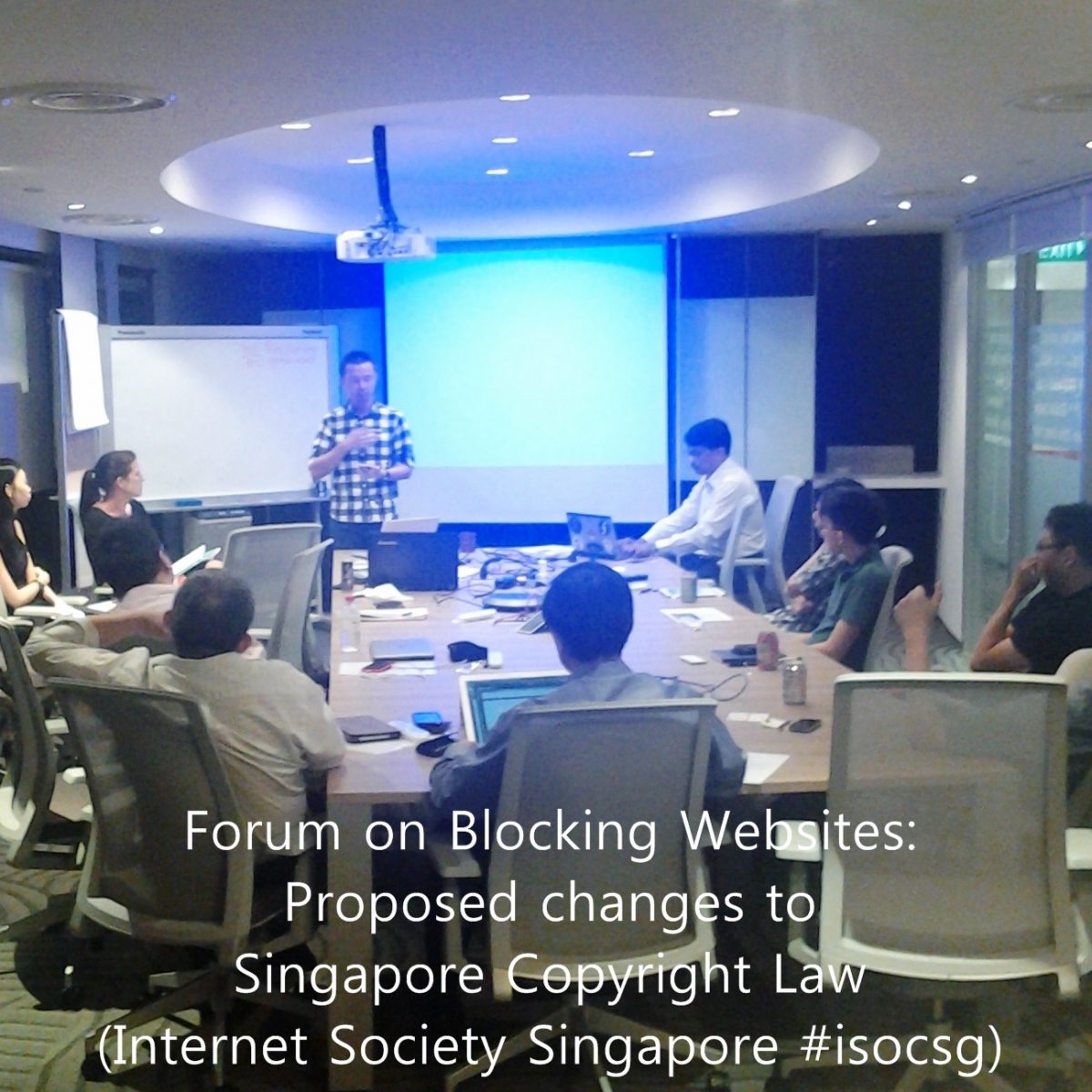Public Consultation on the Proposed Amendments to the Copyright Act: Feedback at a Meeting Organised by the Internet Society and the Asian Internet Coalition
Venue: Office of Red Hat, 8 Shenton Way #10-00, AXA Tower
Date: 21 April 2014
Time: 7 pm to 9.15 pm
Disclaimer: Because of the diversity of those attending, the views expressed should not be taken as representative of those present. Rather, they should be seen as offering a diversity of opinions pointing out the pros, cons, benefits and pitfalls of the proposed amendment.
Attendees:
| Attending as Representatives of Organisations | Attending in Personal Capacity (Names of organisation are places of work) |
| Harish Pillay, Internet Society | Caleb Kow, TuCows, Inc |
| Goh Lih Shiun, Asia Internet Coalition | George Goh |
| Steven Liew, Asia Internet Coalition | Bryan Ghows, VIA Law Corporation |
| Bryan Tan, Internet Society | Ang Peng Hwa, NTU |
| Benjamin Ang, Internet Society |
Rationale for the Need of the Amendment
Is there a need for the Amendment? The notice-and-take-down regime has worked well in many other countries. It is not clear that it is not working well in Singapore.
There is no data showing, for example, that ISPs are ignoring rights holders when served with take-down notices. Some of the online companies see invalid take-down notices.
UK, for example, after much debate, has decided not to introduce the law. (See “Government Drops Website Blocking” BBC News, August 3, 2011, http://www.bbc.com/news/technology-14372698.)
Unintended Consequences
The Amendment will protect incumbent rights holders but it may have unintended consequences of stifling new technologies.
The Amendment will discourage business owners from developing a robust notice-and-take-down system as they will now wait for the court order. The notice-and-take-down regime is readily accepted as a current practice.
Exceptions
Copyright law always has exceptions but there are none in this, eg fair dealing, non-commercial use, creative commons licensed material.
Site-Blocking
Site blocking is ineffective as VPNs (virtual private networks) TOR (The Onion Router) networks would make it possible to bypass the site blocking.
Permanence of Injunction
Copyright has a limited lifespan. So while it is efficient for the rights holder, it is not conceptually sound. There should be an expiry period for the injunction.
Recourse For Wrongly Blocked Sites
There should be recourse to sue for damages from those who wrongly claim copyright.
Better Ways
Encouragement should be made for diverse and flexible ways to deliver content to users.
Legal Process
It is possible for someone wanting to block the site to go straight to court with little warning to the possibly offending site. It is likely that once the rights holder has a court order, other sites will fold when presented with the court order. This bypasses legal due process.
ICANN has a Uniform Rapid Suspension (URS) process for handling domain names used for illegal purposes. The Amendment may conflict with this URS process.
Rights holder should prove that actual infringement has taken place.
There is the danger of overblocking. Any block should be of the infringing page, not the entire site.
Better Wording
The definition of what is an ISP should be made clearer. It may be necessary to spell out what is excluded: platforms such as Yahoo, Google and Facebook, domain name registrars and cyberlockers (eg DropBox).

